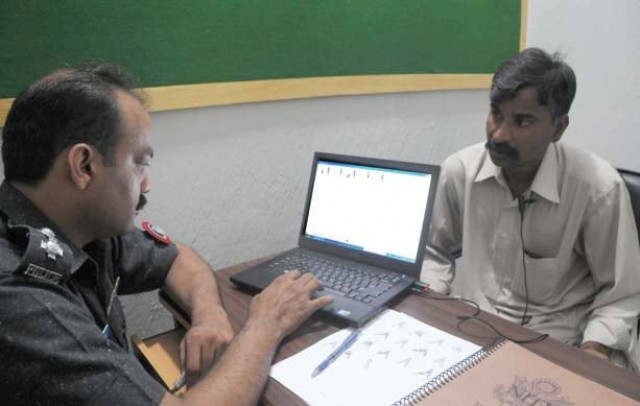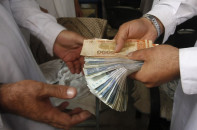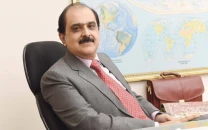For this police unit, if you pass the test, you’re lying
The anti-car lifting cell is slowly learning how to use lie-detection software presented by the FBI.

For this police unit, if you pass the test, you’re lying
Sub-Inspector Rao Shahid won’t lie to you. He had absolutely no faith in the lie detector software that the Americans gave the police earlier this year. But seven cases later, he’s ready to swear by it.
Today he is in charge of the computer voice stress analyser (CVSA) work at the car theft cell. “I think that lie detection software is mainly designed for western countries, where the crime rate is very low compared to countries like Pakistan,” he told The Express Tribune while explaining why he initially thought it would not work. “The criminals in developed countries are not as smart as they are here. I didn’t think it would work here.” His opinion made a complete 180-degree reversal, however, once he actually tested the programme.
They tried it on one of the men who was arrested in the high-profile Chakra Goth case in which a bus full of policemen was ambushed. The suspect wasn’t admitting to being involved, but then the lie-detector results matched what the police investigations had concluded. It worked again in a target killing case on a suspect who knew who was the culprit but was lying about it.
These small successes are however not enough to sway the entire police force. So far, Shahid is a lone ranger when it comes to believing in this system. The Sindh police are more comfortable with traditional ways of policing and investigating a crime. This usually involves the less sophisticated but results-oriented methods that combine beating the truth out of a suspect and using a vast network of neighbourhood snitches. Indeed, when asked, both senior and lower-ranking investigators admitted that they preferred their “own style of investigation”. None of them rated CVSA as an effective technology. “In my personal opinion, it is simply the waste of time,” one official told The Express Tribune.
Three months ago, the US Federal Bureau of Investigation (FBI) offered the police a CVSA set that was handed over to the Anti-Car Lifting Cell (ACLC). The other unit that has the software is the Crime Investigation Department (CID), which got its set years ago but hasn’t put it to any ostensible use. Only Shahid at the ACLC has tinkered successfully with the 9,000-dollar software so far.
Voice stress analysis technology doesn’t claim to detect lies. The programme records voice microtremors which are caused by the stress of trying to conceal or deceive when a person responds to a stimulus (such as a question). The CVSA is not the same as the polygraph, which attempts to measure changes in respiration, heart rate, and galvanic skin response. But just like the polygraph, neither is the CVSA admissible in court.
In the CVSA, a microphone is attached to the person and they are asked 10 to 15 questions to which they can only answer ‘Yes’ or ‘No’. At first, irrelevant questions are asked, such as ‘Is your name Nadeem?’ or ‘Is the sky blue’. Some control questions are asked, in which a lie is solicited in order to establish a hit on the graph. Then relevant questions are popped in and their response is compared to the peaks and troughs of lies and truths.
With the CVSA software sets, the police were given two laptops and catalogues and select investigators was trained for a week by the FBI instructors. “The training was too brief [for us to become] fully aware of the technology and its advantages,” admits ACLC chief SSP Javed Akbar Riaz. But then he arranged for more training and even had a sound-proof room built for the CVSA questioning. He feels that they can only be entirely certain that the CVSA works after at least 50 cases.
The other unit that was given the technology is the CID, but it hasn’t been interested in using it so far. An official said that most of the investigators associated with this specialised wing were not even aware that the department had the software.
The jury is still out on the effectiveness of lie-detection software. In a 2008, National Institute of Justice Journal paper, Dr Kelly Damphousse of the University of Oklahoma wrote about the results when they tested two voice stress analyser programmes. He cautioned that they found they had an approximately 50% accuracy rate in detecting deception. But because the mere presence of a lie detector during an interrogation may deter a person from lying, Damphousse said that law enforcing officers should weigh all the factors before deciding to use the technology.
As for the Sindh police, they may prefer old-school techniques but by completely rejecting the possibility that this technology could help, they may be lying to themselves.
Published in The Express Tribune, November 14th, 2011.



















COMMENTS
Comments are moderated and generally will be posted if they are on-topic and not abusive.
For more information, please see our Comments FAQ